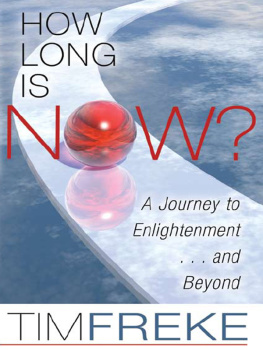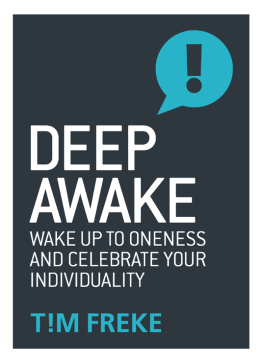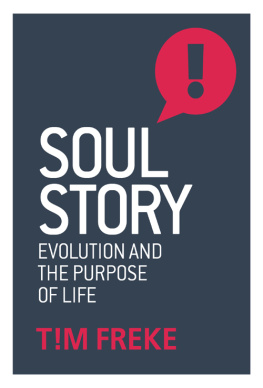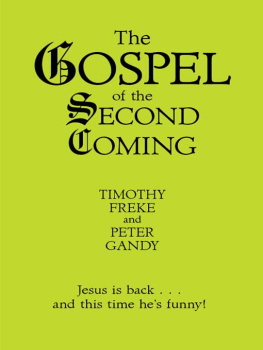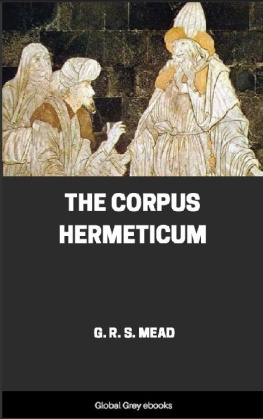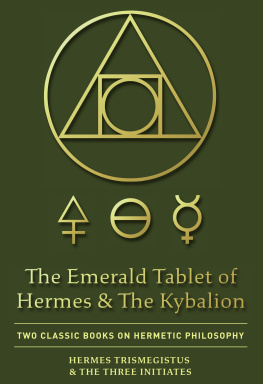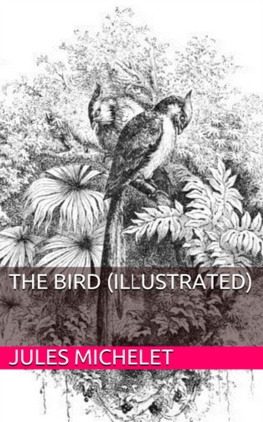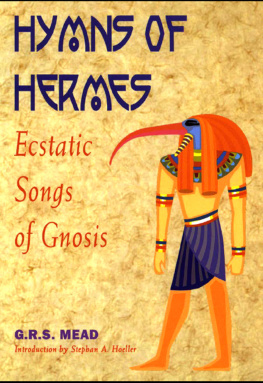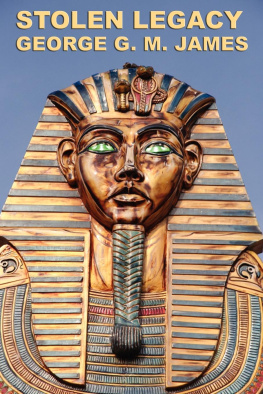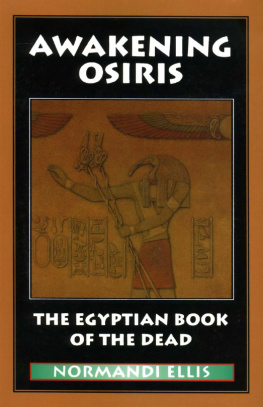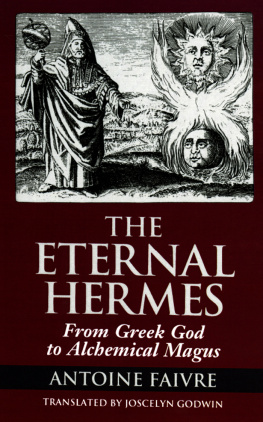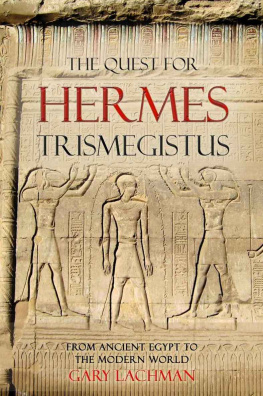THE HERMETICA
The Lost Wisdom
of the Pharaohs
Tim Freke &
Peter Gandy
To the memory of Giordano Bruno, 1548-1600
Mundus Nihil Pulcherrimum
The World is a Beautiful Nothing
T!M FREKE is a spiritual pioneer whose work has touched the lives of hundreds of thousands of people. He is the author of more than 30 books, which have been translated into 15 languages, including a top 6 Amazon 'Surprise Bestseller' and Daily Telegraph 'Book of the Year'.
Tim has spent his life exploring world spirituality and is able to guide others to a direct experience of the awakened state. He presents life-transforming retreats, experiential seminars and entertaining evenings of 'standup philosophy' throughout the world and online.
To watch free videos of Tim, find out about forthcoming events and subscribe to his inspirational 'WAKE UP CALL' newsletter, visit www.timfreke.com
Peter Gandy has an M.A. in classical civilisation and is an internationally respected authority on the ancient Pagan Mysteries and early Christianity.
Cover art by Dannii Evans - www.onetaste.co.uk
Copyright 1997 by Timothy Freke. All rights reserved worldwide. No part of this publication may be replicated, redistributed, or given away in any form without the prior written consent of the author/publisher or the terms relayed to you herein.
TABLE OF CONTENTS
THE LAST WORDS OF THRICE-GREAT HERMES
'Wise words,
although written
by my decaying hand,
remain imperishable
through time;
Imbued with the medicine
of immortality
by the All-Master.
Be unseen
and undiscovered
by all those
who will come and go,
wandering
the wastelands of life.
Be hidden,
until an older heaven
births human beings
who are worthy
of your wisdom.'
Having sounded this prayer
over the works of his hands,
Hermes was received
in the sanctuary of eternity.
INTRODUCTION
A FORGOTTEN SPIRITUAL CLASSIC
The Hermetica is a collection of writings attributed to Thoth a mythical ancient Egyptian sage whose wisdom is said to have transformed him into a god. Thoth, who was venerated in Egypt from at least 3000 BCE, is credited with the invention of sacred hieroglyphic writing, and his figure, portrayed as a scribe with the head of an ibis, can be seen in many temples and tombs. He is the dispatcher of divine messages and recorder of all human deeds. In the Great Hall of Judgment, the after-life court of the god Osiris, Thoth would establish whether the deceased had acquired spiritual knowledge and purity, and so deserved a place in the heavens. Thoth was said to have revealed to the Egyptians all knowledge on astronomy, architecture, geometry, medicine and religion, and was believed by the ancient Greeks to be the architect of the pyramids. The Greeks, who were in awe of the knowledge and spirituality of the Egyptians, identified Thoth with their own god Hermes, the messenger of the gods and guider of souls in the realm of the dead. To distinguish the Egyptian Hermes from their own, they gave him the title 'Trismegistus', meaning 'Thrice-Great', to honour his sublime wisdom. The books attributed to him became collectively known as the 'Hermetica'.
Although largely unknown today, the writings attributed to Hermes/Thoth have been immensely important in the history of Western thought. They profoundly influenced the Greeks and, through their rediscovery in fifteenth-century Florence, helped to inspire the 'Renaissance' which gave birth to our modern age. The list of people who have acknowledged a debt to the Hermetica reads like a 'Who's Who' of the greatest philosophers, scientists and artists that the West has produced Leonardo da Vinci, Durer, Botticelli, Roger Bacon, Paracelsus, Thomas More, William Blake, Kepler, Copernicus, Isaac Newton, Sir Walter Raleigh, Milton, Ben Johnson, Daniel Defoe, Shelley and his wife Mary, Victor Hugo and Carl Jung. It heavily influenced Shakespeare, John Donne, John Dee and all the poet-philosophers who surrounded the court of Queen Elizabeth I, as well as the founding scientists of the Royal Society in London, and even the leaders who inspired the Protestant Reformation in Europe. The list is endless, with the Hermetica's influence reaching well beyond the frontiers of Europe. Islamic mystics and philosophers also trace their inspiration back to Thrice-Great Hermes, and the esoteric tradition of the Jews equated him with their mysterious prophet Enoch.
The Hermetica is a cornerstone of Western culture. In substance and importance it is equal to well-known Eastern scriptures like the Upanishads , the Dhammapada and the Tao Te Ching . Yet, unlike these texts which are now readily available and widely read, the works of Hermes have been lost under the dead weight of academic translations, Christian prejudice and occult obscurities. Until now, no simplified rendering of these writings has been available to the general reader. All previous versions in the English language are very dense, impenetrable, and loaded down with notes and subtext that make them difficult to digest. This new version, however, makes this ancient wisdom more easily accessible. It presents carefully selected extracts of the Hermetic texts, linked together into a narrative and rendered into easily understood English. What emerges is an inspiring and illuminating taste of a forgotten classic.
THE HISTORY OF THE HERMETICA
The early origins of the Hermetica are shrouded in mystery, but the evidence suggests it is a direct descendant of the ancient philosophy of the Egyptians. However, the handful of surviving works attributed to Hermes are not written in ancient Egyptian hieroglyphs, but in Greek, Latin and Coptic. They were collated in the city of Alexandria in Egypt during the second and third centuries CE. Here the Hermetic philosophy helped inspire some of the greatest intellectual achievements of the ancient world. Alexandria was a great centre of learning, surpassing even Athens. Its founder, Alexander the Great, had conquered and united Greece, Persia, Egypt and India into one vast empire. Cultures that had grown up more or less independently were brought together, and there was no bigger melting pot than Alexandria. Into this new 'Universal City' (Gk. cosmos-polis ), poured men and women of every race and nation. Greeks, Jews, Egyptians, Babylonians, Phoenicians and even Buddhists from India associated together in relative peace.
The Alexandrians were renowned for their thirst for knowledge, and under the enlightened Greek ruler Ptolemy I a library and museum were founded where human beings first systematically collected the wisdom of the world. At its height, the library of Alexandria housed some half a million scrolls. These included the works of Euclid, Archimedes and the astronomer Ptolemy, who dominated the spheres of geometry, mathematics and geography respectively until well into the Middle Ages. It contained the research of Aristarchus of Samos, who had shown that the Earth is one of the planets orbiting the sun, and Eratosthenes, who had calculated the circumference of the Earth to within a few per cent. Scientists of the library knew about the precession of the equinoxes and that the moon was responsible for the rhythm of the tides. Alexandria was also rich in esoteric knowledge Pythagorism, Chaldean oracles, Greek myths, Platonic and Stoic philosophy, Judaism, Christianity, the Greek Mystery Schools, Zoroastrianism, astrology, alchemy, Buddhism and of course the ancient Egyptian religion were all practised, studied, compared and discussed.
The golden age of Alexandria came to an end with the birth of the intolerant Christian 'Holy' Roman Empire. Despite the sophistication and cultural achievements of the ancients, the Christians referred to them dismissively as 'Pagans', which means 'country-dwellers'. In 415 CE, Hypatia, one of the last great scientists and Pagan philosophers working at the library of Alexandria, was seized by a mob of Christians, who removed her flesh with scallop shells and burnt her remains. Their leader, Bishop Cyril, was later canonised St Cyril. The great library was finally destroyed as so much Pagan superstition, and this wealth of knowledge was scattered to the four winds. The Christian Roman Emperor Theodosius closed Pagan temples across the empire and began the previously unknown phenomenon of book-burning. For the West, the fifth century ushered in the thousand-year period appropriately known as the Dark Ages.


